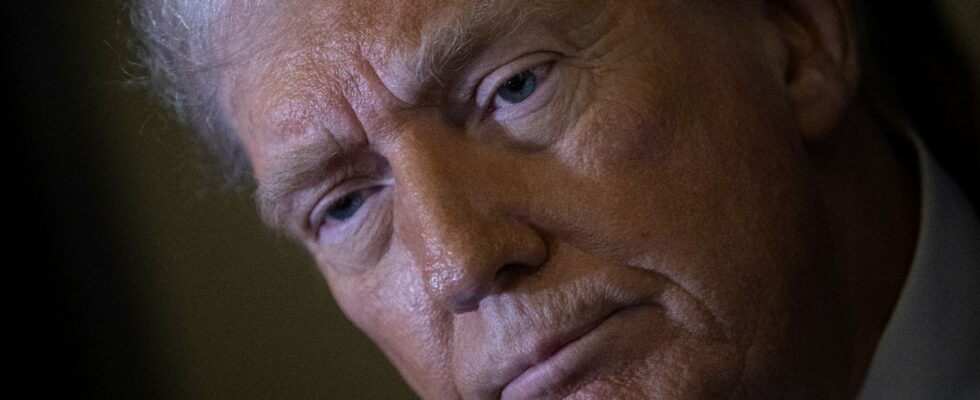“I hang my campaign”. On April 1, 2024, the Republican voters shivered by discovering the e-mail of Donald Trump, before realizing, in a click, that it was a traditional hoax of the April Fish. This year, the amazement may well be real. This Wednesday, April 2, it is no longer a few seconds of uncertainty, quickly dissipated by a mocking bond, but a shock wave that threatens to shake the world economy. After targeting steel and aluminum and the automotive sector with 25 % customs duties, the American president is preparing to take a new stage. This Wednesday, which he describes as “Liberation Day”, Le Chantre du Maga (Make America Great Again) Account for new “reciprocal” customs barriers.
Since his return to the Oval Office on January 20, Donald Trump has cultivated his unpredictability by engaging in an escalation on the amount of taxes applied to products imported into the United States. A strategy not without consequences. The actions of airlines have been struck by warnings in dropping demand, Delta Air Lines, American Airlines and United Airlines having dropped approximately 30 % since the February peak in the S & P. Banks, another sector sensitive to increasing fears of recession, also suffered from these announcements: among others, Citigroup, Morgan Stanley and Goldman Sachs are %. And this, not to mention the spectacular fall of 30 % of the company of Elon Musk, Tesla. But if the markets are starting to ruminate the possibility of a future recession, some American companies enthusiastically welcome this salvo of customs tariffs.
American steel protected, but at what price?
The American steel industry is one of the rare sectors to see this new protectionist wave. Entering in mid-March, customs duties of 25 % on steel and aluminum imported to the United States was imposed by the American president. By taxing imports more heavily, Washington intends to offer respite to national producers, abused for decades by foreign competition. Good news for Stephen Capone, president of Capone Iron Corporation, manufacturer of steel products. “For too long, Canadian competitors have flooded the New England market for cheap steel products, preventing local businesses from concluding business. They decimated our market,” he said to our colleagues of New York Times.
In the short term, the steel industry could thus “observe a gain due to the immediate reduction in Canadian competition”, maintains Christopher Dembik, investment strategy advisor at Pictet Asset Management, interviewed by L’Express. “Historically, there have always been taxes and Canada benefited from price exemptions for aluminum and steel exports. This means that authorization, in terms of competitiveness, there was an extremely important differential compared to American companies,” he continues. The country of Mark Carney was not the only one concerned with this unfair competition. According to Philip Bell, president of the Steel Manufacturers Association (an American commercial group, editor’s note), interviewed by the New York daily, Mexican companies imported cheap steel from China and exported it to the United States, at an unbeatable price.
Enthusiasm could however be short -lived. “The steers in the United States will win, but studies show that these jobs are saved at an exorbitant cost for the economy. There is such disruption in the production chains, that in net, the community loses there,” summarizes Raphaël Gallardo, chief economist of the French investment fund Carmignac. In the long term, the bet of the Trump administration is based on hope: that of a vast movement of industrial relocation. An American philosophy inherited from the 19th century, when Democrats and Republicans favored customs tariffs to protect the emerging manufacturing industry. “They are aware that in the short term, the benefits will be marginal. On the other hand, the taxes coupled with subsidies very clearly favor the relocation of the activity. At the same time, they try to have agreements with several countries to access the metal reserves. This should be beneficial to the long -term manufacturing industry,” said Christopher Dembik.
And this, with one goal: to reduce the trade deficit of the United States. “These customs rights will be more effective ‘than those of the first mandate because all countries should be affected. We will therefore not assist in commercial deviation phenomena which have for example allowed China to continue exporting to the United States via Vietnam and Mexico. It will be effective but at an extremely high cost for the American economy”, analyzes Raphaël Gallardo.
Automobile: Breakdown in new costs, opportunity for the occasion
While the American steel industry welcomes the new protectionist wave, the automotive sector hits the cost of raw materials. According to the economic magazine Forbesalmost all new vehicles are made up of steel up to 54 % of their average weight, as well as 12 % aluminum. Soon faced with increasing production costs, manufacturers must also compose with a market weakened by a drop in consumer confidence. In February, it recorded its strongest fall since 2021, a worrying signal for a sector where the purchase of a vehicle represents a major financial decision. And this, for the benefit of used cars whose average price dropped by 3.3 % over the past year. For Forbes“the drop in consumer confidence will probably encourage the Fed to speed up the rate adjustments, and therefore stimulate second -hand car sales”.
But car manufacturers have not said their last word. Like Donald Trump’s first term, US companies could, in the long term, implement tax bypass. “In 2022, income related to customs tariffs with regard to China reached a record amount. The next year, this collapsed for the simple reason that companies have bypassed these taxes. It is therefore very difficult to model the exact impact of these customs duties,” explains Christopher Dembik. But to advise the investment strategy advisor at Pictet Asset Management, a certainty remains: on April 2, a “very bad news” should be announced.
